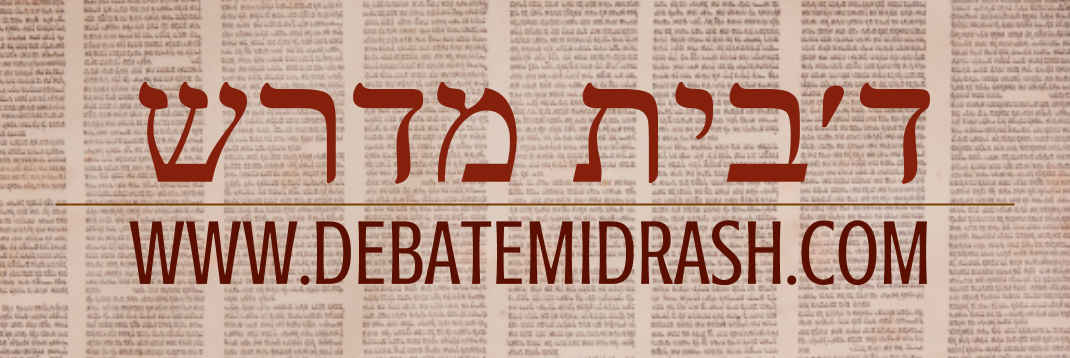| 1. Korah the son of Izhar, the son of Kohath, the son of Levi took [himself to one side] along with Dathan and Abiram, the sons of Eliab, and On the son of Peleth, descendants of Reuben. | | א. וַיִּקַּח קֹרַח בֶּן יִצְהָר בֶּן קְהָת בֶּן לֵוִי וְדָתָן וַאֲבִירָם בְּנֵי אֱלִיאָב וְאוֹן בֶּן פֶּלֶת בְּנֵי רְאוּבֵן: |
| 2. They confronted Moses together with two hundred and fifty men from the children of Israel, chieftains of the congregation, representatives of the assembly, men of repute. | | ב. וַיָּקֻמוּ לִפְנֵי משֶׁה וַאֲנָשִׁים מִבְּנֵי יִשְׂרָאֵל חֲמִשִּׁים וּמָאתָיִם נְשִׂיאֵי עֵדָה קְרִאֵי מוֹעֵד אַנְשֵׁי שֵׁם: |
| 3. They assembled against Moses and Aaron, and said to them, "You take too much upon yourselves, for the entire congregation are all holy, and the Lord is in their midst. So why do you raise yourselves above the Lord's assembly?" | | ג. וַיִּקָּהֲלוּ עַל משֶׁה וְעַל אַהֲרֹן וַיֹּאמְרוּ אֲלֵהֶם רַב לָכֶם כִּי כָל הָעֵדָה כֻּלָּם קְדשִׁים וּבְתוֹכָם יְהֹוָה וּמַדּוּעַ תִּתְנַשְּׂאוּ עַל קְהַל יְהֹוָה: |
| 4. Moses heard and fell on his face. | | ד. וַיִּשְׁמַע משֶׁה וַיִּפֹּל עַל פָּנָיו: |
| 5. He spoke to Korah and to all his company, saying, "In the morning, the Lord will make known who is His, and who is holy, and He will draw [them] near to Him, and the one He chooses, He will draw near to Him. | | ה. וַיְדַבֵּר אֶל קֹרַח וְאֶל כָּל עֲדָתוֹ לֵאמֹר בֹּקֶר וְיֹדַע יְהֹוָה אֶת אֲשֶׁר לוֹ וְאֶת הַקָּדוֹשׁ וְהִקְרִיב אֵלָיו וְאֵת אֲשֶׁר יִבְחַר בּוֹ יַקְרִיב אֵלָיו: |
| 6. Do this, Korah and his company: Take for yourselves censers. | | ו. זֹאת עֲשׂוּ קְחוּ לָכֶם מַחְתּוֹת קֹרַח וְכָל עֲדָתוֹ: |
| 7. Place fire into them and put incense upon them before the Lord tomorrow, and the man whom the Lord chooses he is the holy one; you have taken too much upon yourselves, sons of Levi." | | ז. וּתְנוּ בָהֵן | אֵשׁ וְשִׂימוּ עֲלֵיהֶן | קְטֹרֶת לִפְנֵי יְהֹוָה מָחָר וְהָיָה הָאִישׁ אֲשֶׁר יִבְחַר יְהֹוָה הוּא הַקָּדוֹשׁ רַב לָכֶם בְּנֵי לֵוִי: |
| 8. Moses said to Korah, "Please listen, sons of Levi. | | ח. וַיֹּאמֶר משֶׁה אֶל קֹרַח שִׁמְעוּ נָא בְּנֵי לֵוִי: |
| 9. Is it not enough that the God of Israel has distinguished you from the congregation of Israel to draw you near to Him, to perform the service in the Mishkan of the Lord and to stand before the congregation to minister to them? | | ט. הַמְעַט מִכֶּם כִּי הִבְדִּיל אֱלֹהֵי יִשְׂרָאֵל אֶתְכֶם מֵעֲדַת יִשְׂרָאֵל לְהַקְרִיב אֶתְכֶם אֵלָיו לַעֲבֹד אֶת עֲבֹדַת מִשְׁכַּן יְהֹוָה וְלַעֲמֹד לִפְנֵי הָעֵדָה לְשָׁרְתָם: |
| 10. He drew you near, and all your brothers, the sons of Levi with you, and now you seek the kehunah as well? | | י. וַיַּקְרֵב אֹתְךָ וְאֶת כָּל אַחֶיךָ בְנֵי לֵוִי אִתָּךְ וּבִקַּשְׁתֶּם גַּם כְּהֻנָּה: |
| 11. Therefore, you and your entire company who are assembled are against the Lord, for what is Aaron that you should complain against him?" | | יא. לָכֵן אַתָּה וְכָל עֲדָתְךָ הַנֹּעָדִים עַל יְהֹוָה וְאַהֲרֹן מַה הוּא כִּי תַלִּינוּ עָלָיו: |
| 12. Moses sent to call Dathan and Abiram, the sons of Eliab, but they said, "We will not go up. | | יב. וַיִּשְׁלַח משֶׁה לִקְרֹא לְדָתָן וְלַאֲבִירָם בְּנֵי אֱלִיאָב וַיֹּאמְרוּ לֹא נַעֲלֶה: |
| 13. Is it not enough that you have brought us out of a land flowing with milk and honey to kill us in the desert, that you should also exercise authority over us? | | יג. הַמְעַט כִּי הֶעֱלִיתָנוּ מֵאֶרֶץ זָבַת חָלָב וּדְבַשׁ לַהֲמִיתֵנוּ בַּמִּדְבָּר כִּי תִשְׂתָּרֵר עָלֵינוּ גַּם הִשְׂתָּרֵר: |
| 14. You have not even brought us to a land flowing with milk and honey, nor have you given us an inheritance of fields and vineyards. Even if you gouge out the eyes of those men, we will not go up." | | יד. אַף לֹא אֶל אֶרֶץ זָבַת חָלָב וּדְבַשׁ הֲבִיאֹתָנוּ וַתִּתֶּן לָנוּ נַחֲלַת שָׂדֶה וָכָרֶם הַעֵינֵי הָאֲנָשִׁים הָהֵם תְּנַקֵּר לֹא נַעֲלֶה: |
| 15. Moses was exceedingly distressed, and he said to the Lord, "Do not accept their offering. I have not taken a donkey from a single one of them, and I have not harmed a single one of them." | | טו. וַיִּחַר לְמשֶׁה מְאֹד וַיֹּאמֶר אֶל יְהֹוָה אַל תֵּפֶן אֶל מִנְחָתָם לֹא חֲמוֹר אֶחָד מֵהֶם נָשָׂאתִי וְלֹא הֲרֵעֹתִי אֶת אַחַד מֵהֶם: |
| 16. Moses said to Korah, "You and your entire congregation should be before the Lord you, they, and Aaron tomorrow. | | טז. וַיֹּאמֶר משֶׁה אֶל קֹרַח אַתָּה וְכָל עֲדָתְךָ הֱיוּ לִפְנֵי יְהֹוָה אַתָּה וָהֵם וְאַהֲרֹן מָחָר: |
| 17. Let each man take his censer and place incense upon it, and let each man present his censer before the Lord; [there will thus be] two hundred and fifty censers, and let you and Aaron each [take] his censer. | | יז. וּקְחוּ | אִישׁ מַחְתָּתוֹ וּנְתַתֶּם עֲלֵיהֶם קְטֹרֶת וְהִקְרַבְתֶּם לִפְנֵי יְהֹוָה אִישׁ מַחְתָּתוֹ חֲמִשִּׁים וּמָאתַיִם מַחְתֹּת וְאַתָּה וְאַהֲרֹן אִישׁ מַחְתָּתוֹ: |
